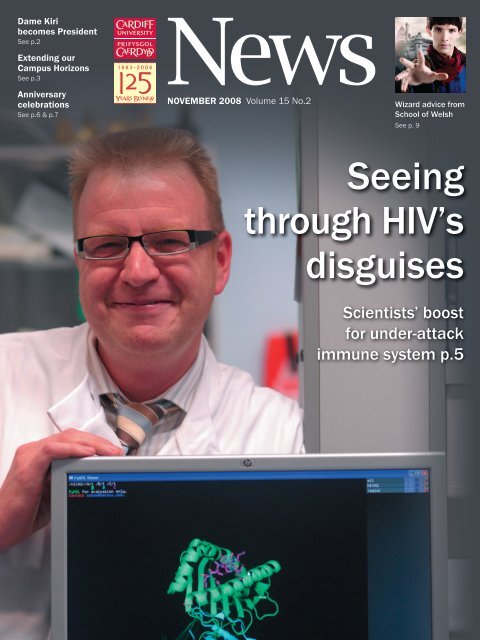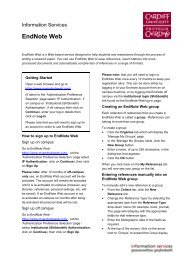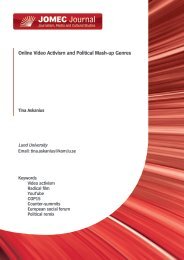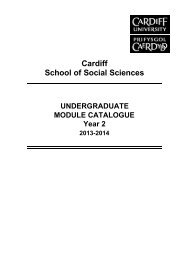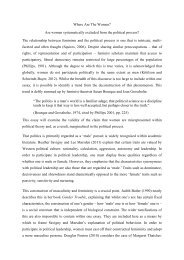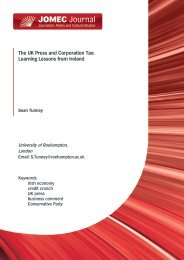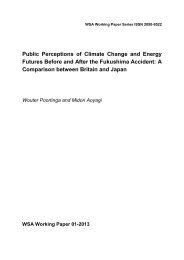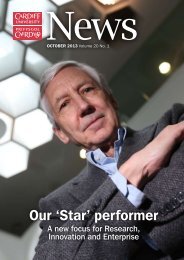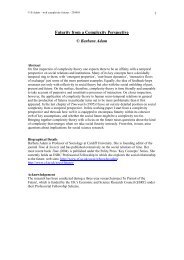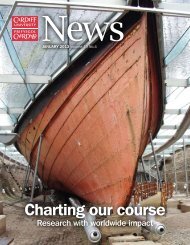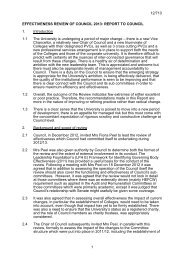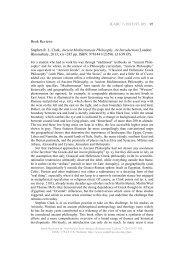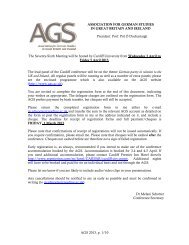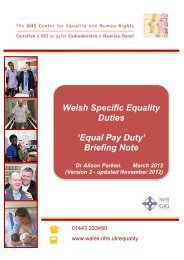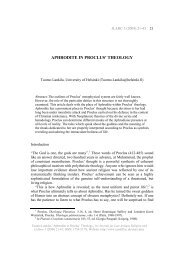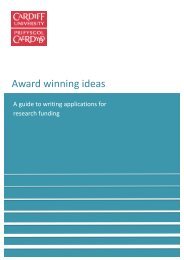Seeing through HIV's disguises - Cardiff University
Seeing through HIV's disguises - Cardiff University
Seeing through HIV's disguises - Cardiff University
Create successful ePaper yourself
Turn your PDF publications into a flip-book with our unique Google optimized e-Paper software.
Dame Kiri<br />
becomes President<br />
See p.2<br />
Extending our<br />
Campus Horizons<br />
See p.3<br />
Anniversary<br />
celebrations<br />
See p.6 & p.7<br />
News<br />
NOVEMBER 2008 Volume 15 No.2 Wizard advice from<br />
School of Welsh<br />
See p. 9<br />
<strong>Seeing</strong><br />
<strong>through</strong> HIV’s<br />
<strong>disguises</strong><br />
Scientists’ boost<br />
for under-attack<br />
immune system p.5
NEWS<br />
Dame Kiri becomes<br />
Academy President<br />
International opera star Dame Kiri Te Kanawa is to become President of the<br />
<strong>Cardiff</strong> International Academy of Voice, the <strong>University</strong>’s academy for training<br />
the opera stars of the future.<br />
Dame Kiri will also work with<br />
students of the Academy for a<br />
week next month, culminating<br />
in a public masterclass with a<br />
selection of singers on Tuesday, 9<br />
December at 7.30pm, in the Reardon<br />
Smith Theatre.<br />
Members of the audience will gain<br />
a unique insight into the teaching<br />
methods and vocal techniques used<br />
by one of the world’s most famous<br />
sopranos, as she passes on her<br />
immense knowledge to the Academy’s<br />
young up-and-coming singers.<br />
Dame Kiri Te Kanawa is a familiar<br />
figure in the leading opera houses of<br />
the world, including Covent Garden,<br />
the Chicago Lyric Opera, and the<br />
Sydney Opera House. She is best<br />
known for her repertoire of works by<br />
Mozart and Richard Strauss.<br />
Director of the Academy, worldrenowned<br />
tenor Dennis O’Neill,<br />
said: “Dame Kiri Te Kanawa is not<br />
only the most famous soprano in the<br />
world but has gained a unique place<br />
New deal provides<br />
operatic boost<br />
Carlos Osuna is unique - he’s the<br />
first-ever student of the <strong>Cardiff</strong><br />
International Academy of Voice to<br />
receive the prestigious ‘Santander<br />
Universities’ scholarship.<br />
The scholarship, a new partnership<br />
between <strong>Cardiff</strong> <strong>University</strong> and Abbey<br />
National plc, Banco Santander’s UK<br />
subsidiary, provides opportunities for<br />
overseas students and, in particular,<br />
students from Latin America to<br />
study at <strong>Cardiff</strong> <strong>University</strong>.<br />
Under the partnership, initially<br />
for a period of three years,<br />
three International Excellence<br />
Scholarships are awarded to<br />
postgraduate students from the<br />
11 countries in the ‘Santander<br />
There’s so much going on…<br />
<strong>Cardiff</strong> News contains only a<br />
fraction of the <strong>University</strong>’s news<br />
output, the majority of which is<br />
published at www.cardiff.ac.uk/<br />
news Here are just a few of the<br />
recently featured items.<br />
Universities’ network who wish to<br />
study at the <strong>University</strong>. The network<br />
includes universities in Argentina,<br />
Brazil, Chile, Colombia, Mexico,<br />
Peru, Portugal, Puerto Rico, Spain,<br />
Uruguay and Venezuela<br />
Carlos, who hails from the Mexican<br />
seaside resort of Mazatlan, is no<br />
stranger to study. He started his<br />
vocal studies with Cristina de<br />
Vadillo and later on with Antonio<br />
González Guerrero, conductor of<br />
one of the most recognized choirs of<br />
Mexico, the Angela Peralta Choir.<br />
This gave him the opportunity<br />
to become a soloist, eventually<br />
obtaining a scholarship of the<br />
Training and Improvement Program<br />
for Young Lyric Singers.<br />
Common Cold: The Common Cold<br />
Centre - the world’s first research<br />
centre dedicated to studying<br />
symptoms of the common cold and<br />
recognised around the world for<br />
its innovative and ground-breaking<br />
research – has just celebrated its 20th anniversary.<br />
Full story at: www.cardiff.ac.uk/news/commoncold<br />
in the history of singing and in the<br />
hearts of the public across the globe.<br />
Not so well known is her unstinting<br />
devotion to the new generation<br />
of artists and the development of<br />
their talent. It is with immense<br />
gratitude and pride that we at the<br />
<strong>Cardiff</strong> International Academy of<br />
Voice announce that Dame Kiri has<br />
accepted the Honorary Presidency of<br />
the Academy.”<br />
The Academy provides an<br />
opportunity for early-stage singers<br />
However, the opportunity to work<br />
with one of his all-time opera<br />
hero, Dennis O’Neill, at <strong>Cardiff</strong><br />
<strong>University</strong>’s International Academy<br />
of Voice proved too great. As Carlos<br />
puts it himself, the scholarship allows<br />
him to follow his dream, “to follow<br />
in the footsteps of Dennis OʼNeill<br />
and sing lead roles in the major opera<br />
houses of the world as I know past<br />
students from the Academy have<br />
already achieved this goal!”<br />
Further information on the<br />
Santander Universities scholarship<br />
is available at: www.abbey.com/<br />
csgs/Satellite?c=GSProducto&cid=1<br />
210606340400&pagename=Abbey/<br />
GSProducto/GS_Categoria.<br />
Credit: John Swannell<br />
to perfect vocal techniques and<br />
styles. Students are taught by the best<br />
coaches and language experts as well<br />
as visiting eminent conductors and<br />
international stars from the operatic<br />
world, helping them to fulfil their<br />
international potential.<br />
Tickets for the <strong>Cardiff</strong> masterclass<br />
with Dame Kiri cost £12 full price, £10<br />
concessions and £3 students and are<br />
available from the Academy on<br />
029 2048 1853 or CIAV@cardiff.ac.uk<br />
Made in Wales: The School of Physics<br />
and Astronomy has unveiled a new large<br />
optical telescope for use by students<br />
and the public, which is equal in size to<br />
the largest of any UK university teaching<br />
telescope, and enables a level of image<br />
quality unparalleled by similar sized equipment.<br />
Full story at: www.cardiff.ac.uk/news/madeinwales
Extending our<br />
Campus Horizons<br />
<strong>Cardiff</strong> <strong>University</strong> is embarking<br />
on one of the most ambitious<br />
projects in its history.<br />
As part of its future development<br />
strategy, the <strong>University</strong>’s multi-million<br />
pound Campus Horizons project will<br />
see the creation of extensive new<br />
high-quality infrastructure to support<br />
<strong>Cardiff</strong>’s continuing mission of<br />
becoming a world-leading research<br />
and teaching institution. This will<br />
involve new building developments<br />
and the upgrading of many of the<br />
<strong>University</strong>’s existing facilities,<br />
enhancing the academic environment<br />
for both staff and students.<br />
The scale of the project is such that<br />
staff on the Heath Park and Cathays<br />
Park campuses will all see benefits.<br />
The Campus Horizons project will<br />
enable greater flexibility in how<br />
people learn and work, create space<br />
for growth of research and other<br />
academic activities, as well as support<br />
and encourage collaboration across the<br />
<strong>University</strong>’s campuses and schools.<br />
One of the keystones of the strategy will<br />
be the creation of entirely new facilities,<br />
to be set in outstanding landscaped<br />
surroundings on the former railway<br />
sidings now owned by the <strong>University</strong>.<br />
These are located on the east side of<br />
the railway tracks separating what<br />
is often referred to as “The Maindy<br />
Road Site” from the Humanities<br />
Building and <strong>Cardiff</strong> Business School.<br />
The proposed development will<br />
regenerate a run-down and disused<br />
November 2008<br />
area and provide much-needed<br />
<strong>University</strong> and public investment<br />
which will benefit both the City and<br />
the local community. The Optometry<br />
and Vision Sciences building, which<br />
is close to the proposed gateway<br />
to the new development area, is a<br />
demonstration of the <strong>University</strong>’s<br />
commitment to high quality<br />
sustainable design.<br />
The first phase of the site<br />
development will be the design of<br />
a “Centre of Centres” which will<br />
express the <strong>University</strong>’s commitment<br />
to its future in high quality research.<br />
The new building<br />
design will encompass<br />
the very latest thinking<br />
in environmental and<br />
sustainable developments<br />
and will be a flagship<br />
proposal of which the<br />
<strong>University</strong>, local<br />
residents and <strong>Cardiff</strong><br />
City can be proud.<br />
It will include flexible research space,<br />
office, conference and exhibition<br />
facilities and will set the standard for<br />
the future phases of the project.<br />
The development of this site is<br />
still very much at the inception<br />
stage. Currently the <strong>University</strong> is<br />
in consultation both internally and<br />
with the local planning authority<br />
to produce an overall development<br />
master plan for the site.<br />
The purpose of this plan is to obtain<br />
agreement from key stakeholders,<br />
including staff, students, the planning<br />
authority and the local community<br />
as to the use of the site to meet the<br />
future strategic requirements of the<br />
<strong>University</strong>.<br />
The <strong>University</strong> views the proposals<br />
as strategically significant to its<br />
future growth and reputation. The<br />
importance of this project clearly<br />
cannot be conveyed by its current title<br />
of “The Maindy Road Site.”<br />
That’s why <strong>Cardiff</strong> News is inviting<br />
all staff and students to suggest a new<br />
name for the entire site. The name<br />
should be evocative, reflecting the<br />
prestigious nature of the project, the<br />
importance of academic elements and<br />
its integral role within the <strong>Cardiff</strong><br />
<strong>University</strong> estate – all within two or<br />
three words!<br />
The competition is open to all<br />
members of the <strong>University</strong>. Every<br />
entry will be entered into a draw for<br />
£100 in Amazon vouchers to spend<br />
on books of the winner’s choice. All<br />
the suggestions will go forward for<br />
consideration as the official title of<br />
the new development. You can send<br />
up to three suggestions by going<br />
to the online interactive version of<br />
<strong>Cardiff</strong> News at www.cardiff.ac.uk/<br />
news/newsletter/nov08/<br />
NEWS<br />
Realizing Rights<br />
President Robinson in the Julian Hodge<br />
Building prior to her lecture<br />
The former President of Ireland visited<br />
the <strong>University</strong> recently to deliver the<br />
Hadyn Ellis Distinguished Lecture<br />
and highlight the importance of<br />
placing human rights standards at the<br />
heart of global governance. Around<br />
400 members of the public filled the<br />
Julian Hodge Lecture Theatre to hear<br />
President Mary Robinson deliver an<br />
engaging talk on ‘Ethical Globalization:<br />
A Challenge for the 21st Century’.<br />
President Robinson’s talk drew<br />
heavily on her experiences as former<br />
United Nations Commissioner for<br />
Human Rights and as the founder<br />
of Realizing Rights: the Ethical<br />
Globalization Initiative. With 2008<br />
marking the 60th anniversary of the<br />
Universal Declaration of Human<br />
Rights, President Robinson reminded<br />
her audience that, under the terms of<br />
that document, human rights are a<br />
birthright and those in power have an<br />
obligation to ensure that those rights<br />
are implemented on a global scale.<br />
At the end of her talk, President<br />
Robinson took questions from<br />
members of the audience, including<br />
the First Minister Rhodri Morgan, on<br />
topics as diverse as Barack Obama,<br />
climate justice, the International<br />
Monetary Fund, children’s rights and<br />
the death penalty.<br />
The lecture marked a fitting tribute<br />
to Professor Hadyn Ellis CBE DSc<br />
(1945-2006), formerly Deputy Vice-<br />
Chancellor of <strong>Cardiff</strong> <strong>University</strong>.<br />
Images of research projects from all of the <strong>University</strong>’s Schools<br />
go on display at an Amgueddfa Cymru – National Museum Wales<br />
special exhibition from 5 December to 11 January 2009. The aim of<br />
the free exhibition is to raise awareness of the variety and benefits<br />
of research at <strong>Cardiff</strong>. The images are made up of photographs,<br />
computer generated images and drawings and have been selected<br />
in consultation with the <strong>University</strong>’s Community Engagement Team.<br />
There will also be a televised display of images from many locations<br />
around the <strong>University</strong>. The image left shows recording of biomedical<br />
and physiological movement in the movement analysis laboratory,<br />
School of Occupational and Healthcare Studies. Researchers use the<br />
laboratory to help determine how to restore movement in patients.<br />
3
RESEARCH: HEAlTH RoUNd-Up<br />
SARTRE launches<br />
a new philosophy<br />
for Medicine<br />
<strong>Cardiff</strong> and Bristol Universities<br />
have joined forces in an<br />
unique alliance aimed at<br />
accelerating the translation of medical<br />
research into new treatments and<br />
therapies to benefit patients.<br />
The Severnside Alliance for<br />
Translational Research (SARTRE)<br />
has just secured more than £2M<br />
in funding from the Medical<br />
Research Council. This will build<br />
the infrastructure to allow more<br />
research projects at both Universities<br />
to move forward in the translational<br />
pipeline and facilitate partnerships<br />
with industry. It will also create<br />
the opportunity for more individual<br />
projects to bid for Research Council<br />
funding under its Developmental<br />
Pathway Funding Scheme (DPFS).<br />
A keystone of the new Alliance will<br />
be the creation of a new Professor<br />
of the Practice of Translational<br />
Research. This will be a joint<br />
appointment, acting as a “talent scout”<br />
to identify research projects suitable<br />
for development and also engaging<br />
with industry and the biotechnology<br />
sector to facilitate translation.<br />
The postholder will work with<br />
two new Translational Operations<br />
Managers, one for each institution,<br />
who will ensure that resources are<br />
in place and appropriately targeted<br />
to support translational research<br />
projects. They will project-manage<br />
individual bids and guide researchers<br />
<strong>through</strong> the regulatory, intellectual<br />
property, ethical and research<br />
governance frameworks.<br />
The Alliance also received funding<br />
(£600K) under the Developmental<br />
Pathway Funding Scheme (DPFS)<br />
portfolio to establish a facility for<br />
production of proteins in sufficient<br />
There’s so much going on…<br />
<strong>Cardiff</strong> News contains only a<br />
fraction of the <strong>University</strong>’s news<br />
output, the majority of which is<br />
published at www.cardiff.ac.uk/<br />
news Here are just a few of the<br />
recently featured items.<br />
4<br />
quantity and quality for proof of<br />
concept testing and biological process<br />
development.<br />
The facility will be housed at <strong>Cardiff</strong><br />
<strong>University</strong>, Central Biotechnology<br />
Services (www.cardiff.ac.uk/medic/<br />
cbs) and help researchers overcome<br />
what can be a serious bottleneck<br />
preventing project development.<br />
The Alliance aims to<br />
bring forward projects<br />
right across the range of<br />
diseases and conditions<br />
tackled by experts at both<br />
Universities, combining<br />
significant strengths in<br />
patient cohorts across<br />
the region.<br />
Areas already identified for priority<br />
alliances include:<br />
• Colorectal and hematopoetic<br />
cancers<br />
• Early vascular disease and<br />
hypertension<br />
• Neuropsychiatric illnesses<br />
• Immunological and cell-based<br />
therapies<br />
Professor Paul Morgan, the Dean<br />
of Medical Research at the School<br />
of Medicine, <strong>Cardiff</strong> <strong>University</strong><br />
said: “This award and the creation<br />
of SARTRE is great news for<br />
medical researchers, who should<br />
find swifter pathways to bring their<br />
projects to commercial development.<br />
Furthermore, it is good news for<br />
patients, as pioneering treatments and<br />
therapies will become available more<br />
rapidly.”<br />
Dental Annexe: The First Minister for<br />
Wales, Rhodri Morgan, has opened newly<br />
modernised teaching and administrative<br />
facilities at the School of Postgraduate<br />
Medical and Dental Education. They will<br />
bring together staff and students within<br />
the dental section on one site for the first time. Full<br />
story at: www.cardiff.ac.uk/news/dentalannexe<br />
Easing arthritis pain<br />
Arthritis sufferers might find some<br />
relief in a new compound found<br />
to ease bone damage in mice by<br />
researchers at the School of Medicine<br />
and colleagues.<br />
The laboratories of Dr Eddie<br />
Wang, a senior lecturer in Medical<br />
Biochemistry, and Dr Anwen<br />
Williams (Rheumatology) found<br />
that mice lacking a protein molecule<br />
called Death Receptor 3 (DR3) are<br />
freed from the bone damage usually<br />
caused by arthritis.<br />
Patients with rheumatoid arthritis are<br />
more likely to have extra copies of the<br />
gene that codes for DR3. Perhaps of<br />
even greater significance, treatment<br />
with an antibody that blocked the<br />
binding of DR3 to its specific binding<br />
partner TL1A significantly reduced<br />
joint pathology, providing proof-ofprinciple<br />
of a potential therapy.<br />
New gum disease<br />
bacteria found<br />
A new species of oral bacteria has<br />
been found by School of Dentistry<br />
researchers working with colleagues<br />
in London.<br />
The bacteria, named Prevotella<br />
histicola, could contribute to gum<br />
disease and tooth decay and could<br />
help us understand how mouth<br />
problems develop. They have also<br />
been linked to infections in other<br />
parts of the body. The findings<br />
were reported in the International<br />
Journal of Systematic and<br />
Evolutionary Biology.<br />
The mouth is host to hundreds of<br />
different species of bacteria, many<br />
of them still unknown. Three<br />
strains of the bacteria were isolated<br />
from tissue specimens taken from<br />
patients with oral cancer at the<br />
Dental School, as part of a study<br />
to determine what, if any, bacteria<br />
were living inside mouth tumours.<br />
Laboratory tests have also shown how<br />
DR3 might also induce the development<br />
of bone destroying cells in humans.<br />
Dr Wang, of the School’s Infection<br />
Immunology and Inflammation (I3)<br />
Research Group, said: “A few stones<br />
remain unturned in the hunt for the<br />
proteins which cause bone damage,<br />
as blocking DR3 didn’t eliminate<br />
bone destruction altogether. However,<br />
it did reduce a lot of the damage,<br />
suggesting DR3 plays an important<br />
part in the onset of disease. It could<br />
therefore be an important target in the<br />
treatment of rheumatoid arthritis and<br />
other diseases where disrupted bone<br />
physiology is seen.”<br />
The research was carried out with<br />
colleagues at the <strong>University</strong> of<br />
Southampton. The findings have<br />
been published in the Journal of<br />
Experimental Medicine.<br />
From DNA analysis the <strong>Cardiff</strong><br />
team of Dr Sam Hooper and Dr<br />
Melanie Wilson realised that these<br />
strains didn't match any known<br />
species. Their collaborators at the<br />
King's College Infection Research<br />
Group confirmed this with an array<br />
of biochemical and physiological<br />
tests. The tests showed that the<br />
novel species was part of the<br />
Prevotella family of bacteria, which<br />
are known to cause many different,<br />
painful infections in the mouth and<br />
other body sites.<br />
Dr Hooper, of the School’s Oral<br />
Microbiology Group, said:<br />
“We suspect this new species<br />
might also play a role in disease.<br />
Discovering more of these<br />
unrecognised bacteria is important<br />
as it gives us a better picture of how<br />
oral diseases, such as tooth decay<br />
and gum disease, are caused and<br />
thus how they might be treated.”<br />
Dr Who: The 45th anniversary<br />
of Doctor Who is to be marked<br />
with an academic conference, the<br />
‘Whoniversal Appeal’ , which will<br />
examine issues of morality, history,<br />
philosophy, fan culture, sexuality,<br />
and technology which surround the hit science fiction<br />
series. Full story at: www.cardiff.ac.uk/news/drwho
HIVʼs <strong>disguises</strong> no match<br />
for engineered killer T-cells<br />
Professor Andy Sewell of the<br />
School of Medicine is part<br />
of an international group of<br />
scientists which have engineered<br />
immune cells capable of seeing<br />
<strong>through</strong> HIV’s many <strong>disguises</strong>.<br />
When viruses enter our bodies, they<br />
hijack the machinery of host cells in<br />
order to replicate and spread infection.<br />
When our body’s cells are infected<br />
with a virus they expose small parts<br />
of the virus on their surface, offering<br />
a “molecular fingerprint” for killer<br />
T-cells from the immune system to<br />
identify and destroy. HIV however,<br />
has the ability to mutate and disguise<br />
its fingerprints, allowing it to hide<br />
from killer T-cells, such that the<br />
immune system is unable to rid the<br />
body of HIV.<br />
Professor Sewell, and colleagues from<br />
the <strong>University</strong> of Pennsylvania and<br />
from Adaptimmune Ltd UK have<br />
engineered and tested a killer T-cell<br />
receptor that in the laboratory is<br />
able to recognise all of the different<br />
<strong>disguises</strong> which HIV is known to<br />
All-Wales initiative to tackle primary healthcare challenges<br />
Primary care - community based<br />
services such as GPs, pharmacists,<br />
dentists and midwives - plays a crucial<br />
role in the front line of the NHS.<br />
That is particularly the case in<br />
Wales, which has some of the most<br />
disadvantaged communities in<br />
Europe. Effective, comprehensive<br />
primary care improves not only health<br />
but also quality of life.<br />
However, the provision of primary<br />
care varies greatly across the country.<br />
Rural and post-industrial areas pose<br />
very different healthcare challenges.<br />
The Welsh Assembly Government’s<br />
vision is for locally accessible services<br />
There’s so much going on…<br />
<strong>Cardiff</strong> News contains only a fraction<br />
of the <strong>University</strong>’s news output, the<br />
majority of which is published at<br />
www.cardiff.ac.uk/news Here are just<br />
a few of the recently featured items.<br />
November 2008<br />
Professor Andy Sewell<br />
have used to evade detection. The<br />
receptor can also eradicate HIVinfected<br />
cells in culture.<br />
Over 33 million people were estimated<br />
to be living with HIV worldwide in<br />
2007. Although anti-retroviral drugs<br />
have been successful in delaying<br />
the onset of AIDS, no vaccine or<br />
cure yet exists and drug resistance is<br />
increasingly becoming a problem.<br />
offering patients integrated services<br />
from clinical, health and social care<br />
professionals, together with services<br />
for procedures where quality is<br />
enhanced by concentrating them in<br />
fewer, highly specialised centres.<br />
To support this vision, several Welsh<br />
Universities are collaborating to<br />
create the Wales School for Primary<br />
Care Research. Backed by the Welsh<br />
Assembly Government, this will<br />
provide relevant research to help the<br />
development of high quality primary<br />
care in General Practice, Pharmacy,<br />
Nursing, Optometry and Dentistry in<br />
the first instance. It aims to develop<br />
and share excellence in primary<br />
Foreign Secretary: The<br />
Vice-Chancellor welcomed<br />
David Miliband to the<br />
<strong>University</strong> as the Foreign<br />
Secretary visited to launch a<br />
safety campaign for students travelling abroad. Full<br />
story at: www.cardiff.ac.uk/news/foreignsecretary<br />
“In the face of our engineered<br />
assassin cells, the virus will either die<br />
or be forced to change its <strong>disguises</strong><br />
again, weakening itself along the way,”<br />
said Professor Sewell, who is Infection,<br />
Immunology and Inflammation<br />
Interdisciplinary Research Group link<br />
chair. “We’d prefer the first option but<br />
I suspect we’ll see the latter. Even if<br />
we do only cripple the virus, this will<br />
still be a good outcome as it is likely<br />
care research and, in time, work<br />
with professionals across all relevant<br />
disciplines to improve the quality and<br />
quantity of primary care research in<br />
Wales.<br />
The School is a new partnership between<br />
the universities of <strong>Cardiff</strong>, Swansea,<br />
Glamorgan and Bangor. The Director,<br />
Professor Chris Butler, Professor of<br />
Primary Care Medicine at <strong>Cardiff</strong><br />
<strong>University</strong>, said: “Worldwide, health care<br />
delivery is changing fast, with excellent<br />
primary care widely recognised as the<br />
key to a sustainable health service.<br />
But this has to be underpinned by<br />
world-leading research if it is to deliver.<br />
The Wales School for Primary Care<br />
RESEARCH<br />
to become a<br />
much slower<br />
target and be<br />
easier to pick<br />
off. Forcing<br />
the virus to a<br />
weaker state<br />
would likely<br />
reduce its<br />
A killer T-cell<br />
capacity to<br />
transmit within the population and<br />
may help slow or even prevent the<br />
onset of AIDS in individuals.”<br />
Pending regulatory approval, clinical<br />
trials using the engineered killer<br />
T-cells will begin shortly at the<br />
<strong>University</strong> of Pennsylvania.<br />
Professor Sewell is also exploring<br />
using engineered receptors on killer<br />
T-cells as a way of improving immune<br />
responses to cancer. Initial results<br />
indicate that it is possible to engineer<br />
human anti-cancer killer T-cells that<br />
are substantially better than anything<br />
the body is able to produce naturally.<br />
The research has been published this<br />
month in Nature Medicine.<br />
Research brings together researchers<br />
from several primary care disciplines to<br />
develop and share research excellence so<br />
Wales can continue to punch way above<br />
its weight in this crucial field.”<br />
First Minister Rhodri Morgan said:<br />
“The main emphasis of the Wales<br />
School of Primary Care Research<br />
will be to promote a ‘step change’<br />
improvement in the quality and quantity<br />
of multi-disciplinary research. Worldclass<br />
research of international standard<br />
will then generate evidence that is<br />
locally applicable and internationally<br />
relevant to inform practice and policy<br />
in Wales and beyond.”<br />
Building Blocks: Researchers<br />
from the South East Wales Trials Unit<br />
at the School of Medicine, <strong>Cardiff</strong><br />
<strong>University</strong> have led a successful<br />
£4M bid to evaluate the Family<br />
Nurse Partnership programme in England. Full story at:<br />
www.cardiff.ac.uk/news/buildingblocks<br />
5
HEAdER 125TH ANNIVERSARy CElEbRATIoNS<br />
Founders’ Day<br />
A special celebratory event in the presence of staff, students<br />
and other friends and supporters marked 125 years since the<br />
<strong>University</strong>’s foundation on 24 October.<br />
Church bells were rung across the<br />
city, just as they did on the opening<br />
of the <strong>University</strong> in 1883.<br />
Professor Sioned Davies, Head of the<br />
School of Welsh, (pictured right) read the<br />
poem Education - a special commission<br />
for <strong>Cardiff</strong> <strong>University</strong>’s 125th Anniversary<br />
by Gwyneth Lewis, Wales’s inaugural<br />
National Poet.<br />
Personnel from Wales Universities’ Officers<br />
Training Corp marked the occasion by<br />
arranging a ceremonial gun firing.<br />
“Our 125th anniversary celebration<br />
provides good cause for celebration with<br />
the many friends, supporters, members<br />
of the <strong>University</strong> and other stakeholders<br />
upon whom <strong>Cardiff</strong> <strong>University</strong>’s<br />
continued success depends,” wrote<br />
Vice-Chancellor Dr David Grant in a<br />
celebratory supplement in the Western<br />
Mail newspaper.<br />
“Today we can all look with pride upon<br />
achievements and progress across a very<br />
wide range of academic disciplines which<br />
have brought an equally wide range<br />
of benefits to individuals and society<br />
<strong>through</strong>out Wales and in the wider world.”<br />
Ceremonial firing by the 104 Regiment Royal<br />
Artillery (v)<br />
6<br />
Education<br />
(To celebrate the 125th anniversary<br />
of <strong>Cardiff</strong> <strong>University</strong>)<br />
Beiddia feiddio,<br />
gwellha dy wneud.<br />
Mynna geisio,<br />
parcha ddweud.<br />
Trawsnewidiad<br />
fydd dy glod.<br />
Dy ddyfodol:<br />
mentro bod.<br />
Learning’s a passport that returns you home<br />
a better person. It permits you to dare<br />
being daring. Makes you secure<br />
with not knowing everything. Helps you welcome<br />
some failure. Forges an alloy<br />
with others’ thinking. It is simple delight<br />
in mind and its motions. Scintillates<br />
but isn’t deceptive. Admits the joy<br />
of institutes, is the open road<br />
to everywhere but bigotry.<br />
It’s the shortest distance between you and me<br />
and, if you’re lucky, it never ends.<br />
Gwyneth Lewis<br />
Sarah Weste, Master of <strong>Cardiff</strong> Students Bellringing Society, ringing the<br />
Anniversary peal<br />
The <strong>University</strong> Christmas card is now on sale. As part of the<br />
125th anniversary celebrations, 10p from every card sold<br />
will go towards supporting the 125 for 125 campaign to raise<br />
additional funds for students to realise their academic ambition<br />
at <strong>Cardiff</strong> <strong>University</strong>.<br />
Cards are on sale at Graphic Services outlets <strong>through</strong>out the<br />
Cathays Park and Heath Park campuses. Versions can also be<br />
purchased and printed with the names, messages and logos<br />
of individual Schools or Divisions via the Media Resources<br />
Centre Printing. The card can be viewed at www.ecards.cardiff.<br />
ac.uk/christmas, where a wider selection of festive eCards is<br />
also available.
Gala Concert<br />
The <strong>University</strong>’s 125th<br />
anniversary year has seen<br />
many celebratory events, but<br />
none with quite the sense of occasion<br />
as the spectacular gala concert staged<br />
at the Wales Millennium Centre on<br />
Sunday 19th October. Opened with<br />
a fanfare tribute to the <strong>University</strong><br />
- written by leading international<br />
composer and <strong>Cardiff</strong> alumnus Karl<br />
Jenkins, the concert was compèred<br />
with humour and charm by BBC<br />
journalist and <strong>Cardiff</strong> graduate Huw<br />
Edwards.<br />
World-renowned tenor Dennis O’Neill<br />
led the production with vigour,<br />
receiving rapturous applause for his<br />
passionate performance of Nessun<br />
dorma. He was accompanied by<br />
Grammy award-winning soprano<br />
The Presidents’ Dinner was staged at the<br />
Amgueddfa Cymru – National Museum and<br />
Gallery Wales in <strong>Cardiff</strong><br />
Rebecca Evans to sing some of the<br />
world’s best loved classical pieces,<br />
including extracts from La Traviata.<br />
Past and present students from the<br />
<strong>Cardiff</strong> International Academy<br />
of Voice performed <strong>through</strong>out<br />
the afternoon, along with the<br />
School of Music’s Chamber Choir.<br />
Also performed was the poignant<br />
orchestral piece Somewhere<br />
Unknown, a large-scale symphonic<br />
work composed by <strong>Cardiff</strong> PhD<br />
student Liz Lane following the death<br />
of her mother.<br />
As the concert closed, staff, students<br />
and friends of the <strong>University</strong> joined to<br />
sing the Welsh national anthem and<br />
with that united in a great sense of<br />
pride – a truly magnificent birthday<br />
celebration.<br />
Bill Rammell<br />
• Welsh rugby legend Gareth Davies was inducted into the <strong>Cardiff</strong> <strong>University</strong><br />
Rugby Club Hall of Fame at an Anniversary dinner, launching the Former<br />
Players Association, bringing together people who have played rugby for the<br />
<strong>University</strong>. • <strong>University</strong> Hospital Llandough also celebrated an Anniversary<br />
– its 75th – by unveiling a commissioned painting and launching a new<br />
Education Centre for undergraduate and postgraduate medical training.<br />
November 2008<br />
Huw Edwards (left) and Vice-Chancellor Dr David Grant in conversation at the Gala<br />
The proceeds of the concert will go<br />
towards the <strong>University</strong>’s 125 for 125<br />
Scholarship campaign which will<br />
provide financial support<br />
for future generations of students<br />
at <strong>Cardiff</strong>.<br />
Presidents’ Dinner<br />
The first ever Presidents’ Dinner<br />
took place as part of the 125th<br />
anniversary celebrations, bringing<br />
together more than 150 guests,<br />
including 100 alumni.<br />
The Presidents’ Dinner was an<br />
opportunity for the <strong>University</strong> and<br />
the Students’ Union to honour those<br />
who have contributed and will<br />
continue to contribute greatly to the<br />
development of both institutions.<br />
Highlights of the reunion included<br />
Bill Rammell MP, (Minister of State<br />
for Foreign and Commonwealth<br />
Affairs) reflecting on his time as<br />
Students' Union President between<br />
1982 and 1983, a fundraising ‘Money<br />
Can’t Buy’ auction hosted by BBC<br />
Wales News presenter Jamie Owen,<br />
and the launch of the ‘Your Union’<br />
Appeal. Charles Bassett, former<br />
www.cardiff.ac.uk/125<br />
HEAdER<br />
Canadian High Commissioner to<br />
Central Africa and Sir Emyr Jones<br />
Parry and Lady Lynn Jones Parry,<br />
respectively former President and<br />
Vice-President of the Students’<br />
Union were also among the guests.<br />
John Robertson, Director of the<br />
Development and Alumni Relations,<br />
said: “It was tremendous to be<br />
able to invite so many friends,<br />
supporters and colleagues back<br />
to the <strong>University</strong>, particularly in<br />
our anniversary year. It provided<br />
us with a fitting opportunity to<br />
say a personal thank you to all<br />
the hardworking Students’ Union<br />
presidents, sabbatical officers and<br />
Med Club presidents who have<br />
invested their energies in the<br />
<strong>University</strong> and Students’ Union<br />
over the years.”<br />
7
NEWS<br />
Saving Station X<br />
The famous Bletchley Park code-breaking centre has new hope, thanks to a<br />
letter signed by some of the country’s leading scientists. Professor Robert<br />
Churchhouse, a pioneer of computer science at <strong>Cardiff</strong>, was one of them…<br />
In 1952, the story of how code<br />
breakers at Bletchley Park cracked<br />
the German Enigma device<br />
remained an official secret.<br />
A young Robert Churchhouse<br />
certainly had heard nothing about it,<br />
despite being taught Mathematics at<br />
Manchester by two of the men who<br />
had broken the code – Alan Turing<br />
and Max Newman.<br />
Reporting for his first day of national<br />
service to work on ciphers at GCHQ<br />
(Government Communications<br />
Headquarters) in Cheltenham, he was<br />
asked to sign the Official Secrets<br />
Act. He was then handed a thick<br />
typescript book.<br />
The book told an<br />
incredible story of a<br />
German code machine<br />
with an astronomical<br />
number of combinations<br />
which were continuously<br />
changing.<br />
Professor Churchhouse said: “I was<br />
amazed. I asked: ‘How could you solve<br />
this?’ They told me: ‘Well, we did.’ ”<br />
Professor Churchhouse discovered<br />
that most his colleagues had served<br />
during World War II at GCHQ’s<br />
forerunner, Station X at Bletchley<br />
Park, a converted country house in<br />
Buckinghamshire.<br />
From them, he learned more about<br />
the Enigma machine – a deceptively<br />
simple-looking typewriter-style<br />
device used by the German military<br />
to send messages. When a key on the<br />
typewriter was pressed, a combination<br />
of rotors and wires caused a bulb<br />
marked with another letter to light<br />
up, giving the code. The complication<br />
was that there are 1090 possible<br />
Enigma set-ups. Each time a key was<br />
pressed, at least one rotor moved on,<br />
meaning that there would always be a<br />
different substitution alphabet.<br />
8<br />
Professor Churchhouse also learned<br />
about the work his colleagues<br />
had done at Bletchley Park. How<br />
mathematicians, engineers, linguists<br />
and lawyers worked together to<br />
break the Enigma messages. Of the<br />
outstanding bravery of servicemen<br />
who captured Enigma machines and,<br />
vitally, the codebooks giving the rotor<br />
settings for the month – all without the<br />
knowledge of German High Command,<br />
who believed to the end of the war<br />
that Enigma remained unbroken.<br />
Bletchley Park was also a nursery<br />
for the computer age. Another, even<br />
more complex, code machine was<br />
used for the highest level German<br />
military messages – known by the<br />
British as “Tunny”. This has 12<br />
wheels and 10150 possible settings.<br />
However, without ever having seen a<br />
Tunny machine, the Bletchley team<br />
deduced how it worked and built a<br />
giant, valve-powered computer of<br />
their own to crack it. The machine<br />
was known as Colossus and Professor<br />
Churchhouse’s two former lecturers,<br />
Professors Newman and Turing, were<br />
among the men who designed it.<br />
Professor Churchhouse left GCHQ<br />
after ten years. In 1971, he was<br />
invited to <strong>Cardiff</strong>, to take up the first<br />
Chair in what was then a very small<br />
School of Computer Science.<br />
However, his interest in Bletchley<br />
Park remained with him. The work on<br />
Enigma features in his book Codes<br />
and Ciphers. During the 1980s,<br />
teaching a course on data security<br />
to third year undergraduates, he was<br />
able to call in a favour from his old<br />
employers at GCHQ, and borrow an<br />
Enigma machine to show the students.<br />
The workings of the machine was<br />
sometimes set as an exam question<br />
although, perhaps considerately,<br />
Professor Churchhouse never asked<br />
his students to crack the code.<br />
It was therefore logical, when the<br />
School of Computer Science received<br />
a request to help Bletchley Park<br />
earlier this year, that they alerted<br />
Professor Churchhouse, now retired.<br />
Bletchley Park had fallen on hard<br />
times. The Bletchley Park Trust,<br />
which preserves the site on a<br />
charitable basis, needed funding.<br />
Professor Churchhouse explained:<br />
“The main house itself is fine, that’s<br />
where they have the National Museum<br />
of Computing. However, a lot of the<br />
huts in the grounds are in a poor state<br />
of repair, and that’s where groups of<br />
people did some of the most vital work.<br />
“Hut 3, for example, is where they<br />
decrypted signals from the German<br />
Army and the Luftwaffe. Hut 4 is where<br />
those were translated. Hut 6 is where<br />
German Navy ciphers were broken<br />
and Hut 8 determined which messages<br />
should be passed on to the Admiralty.”<br />
In July, Professor Churchhouse and other<br />
leading computer scientists co-signed<br />
a letter to The Times, calling for secure<br />
long-term funding to preserve Bletchley<br />
Park as a resource for the nation.<br />
Professor Churchhouse also carried<br />
out radio interviews explaining the<br />
importance of Bletchley Park. He<br />
believes it should be preserved, both<br />
for its crucial role in the war effort<br />
and in the history of computing.<br />
A WREN operates one of the Bletchley<br />
Park code-breaking machines<br />
He said: “I think it would be a terrible<br />
shame if it was lost or built over.<br />
At least one or two huts should be<br />
kept open, where some of the most<br />
particularly significant work was done.”<br />
Professor Churchhouse with the Enigma<br />
machine he used to teach Computer<br />
Science students at <strong>Cardiff</strong>.<br />
The Times letter, which was also<br />
signed by Professor Nick Fiddian,<br />
Head of the School of Computer<br />
Science and other School members,<br />
had a galvanising effect. The<br />
American computer giant IBM has<br />
announced a large donation to the<br />
upkeep of Bletchley Park. More<br />
recently, a £330,000 grant from<br />
English Heritage will help guarantee<br />
the future of the mansion and talks are<br />
under way on the future of the huts.<br />
Simon Greenish, Director of the<br />
Bletchley Park Trust, said: “'The<br />
letter to The Times on 24th July this<br />
year urged the government to step in<br />
to help save Bletchley Park and was<br />
signed by 97 eminent scientists and<br />
heads of department from Universities<br />
around the country. The publication<br />
of this letter coincided with a visit<br />
to Bletchley Park by Their Royal<br />
Highnesses The Prince of Wales and<br />
The Duchess of Cornwall.<br />
“The combined events of that day<br />
triggered media and public interest in<br />
Bletchley Park on an unprecedented<br />
scale. The Bletchley Park website,<br />
www.bletchleypark.org.uk received<br />
a record 278,000 hits and public<br />
donations came in at a rate the<br />
Bletchley Park Trust had never<br />
experienced before.<br />
“I believe that the awareness in the<br />
UK of the need for the restoration of<br />
Bletchley Park was greatly enhanced<br />
by the combined events of both the<br />
Royal Visit and the letter to The<br />
Times that day and the Bletchley Park<br />
Trust is enormously grateful to the 97<br />
scientists for their support. We are<br />
now far more optimistic that the site<br />
can be restored for future generations.”
Wizard advice from<br />
the School of Welsh<br />
What do we really know about Merlin?<br />
A medieval illustration of young Merlin<br />
telling King Vortigern of two dragons –<br />
a key tale in Welsh folklore<br />
The BBC’s new Saturday drama<br />
about the Merlin’s early life has<br />
triggered fresh interest in the<br />
wizard. An hour-long documentary,<br />
Merlin: The Legend, screened before<br />
the series began, aimed to answer<br />
some of the enduring questions, with<br />
advice from Dr Juliette Wood of the<br />
School of Welsh and the Centre for<br />
Lifelong Learning.<br />
Dr Wood acted as consultant to BBC<br />
Wales, who made the documentary in<br />
association with <strong>Cardiff</strong>-based Green<br />
Bay Media. She appeared explaining<br />
the development of the Merlin myth.<br />
“The story of Merlin has been told<br />
mainly <strong>through</strong> poetry and prose, but<br />
historical facts are hard to find,” said<br />
Dr Wood.<br />
“He does have many forms –<br />
mythical hero and historical bard;<br />
hermit and fierce warrior; wise<br />
man and madman; fighter of evil;<br />
magician and scientist; protector<br />
and poet.”<br />
Dr Wood trained in the United<br />
States, but is now associate lecturer<br />
in the School of Welsh and tutor at<br />
the Centre for Life Long Learning.<br />
She specialises in medieval folklore<br />
and Celtic tradition and is interested<br />
in the modern revival of interest in<br />
magic and Celtic culture. She teaches<br />
courses on such topics as Welsh<br />
Folk Narrative, Celtic Mythology,<br />
Arthurian Literature and the Sources<br />
of Contemporary Pagan Thought.<br />
Her major interest at the present time<br />
November 2008<br />
is the relation between medieval<br />
tradition and popular culture with<br />
special reference to ‘new age’<br />
movements.<br />
She added: “Merlin has been an<br />
important figure in Welsh culture for<br />
centuries, from the Welsh Arthurian<br />
legend in the middle ages to the<br />
Celtic revival in the twentieth century.<br />
We find him still in the contemporary<br />
arts from modern fantasy magicians<br />
like Gandalf and Harry Potter to<br />
Pagan festivals at Stonehenge.<br />
“For centuries, Merlin has influenced<br />
poetry, prose, music, the visual arts,<br />
film and even television. Merlin still<br />
connects us to a past, which we never<br />
quite forget, and to a future which we<br />
can always imagine.”<br />
Front page picture from the drama series<br />
Merlin appears courtesy of the BBC.<br />
Cyngor Cyfareddol o Ysgol y Gymraeg<br />
beth ydyn ni’n wir yn gwybod am Fyrddin?<br />
Sbardunodd drama newydd y BBC<br />
ar ddydd Sadwrn am fywyd cynnar<br />
y dewin ddiddordeb newydd ym<br />
Myrddin. Nod rhaglen ddogfen awr<br />
o hyd, sef Merlin: The Legend a<br />
sgriniwyd cyn y gyfres oedd ateb rhai<br />
o’r cwestiynau oesol, gyda chyngor gan<br />
Dr Juliette Wood o Ysgol y Gymraeg<br />
Bu Dr Wood yn ymgynghorydd i<br />
BBC Cymru, a gynhyrchodd y rhaglen<br />
ddogfen ar y cyd â Green Bay Media<br />
o Gaerdydd. Ymddangosodd yn<br />
esbonio datblygiad chwedl Myrddin.<br />
“Mae chwedl Myrddin wedi’i<br />
hadrodd yn bennaf trwy farddoniaeth<br />
a rhyddiaith, ond mae’n anodd dod o<br />
hyd i ffeithiau hanesyddol,” meddai<br />
Dr Wood.<br />
“Mae ganddo sawl ffurf – arwr<br />
chwedlonol a bardd hanesyddol;<br />
meudwy a rhyfelwr ffyrnig; dyn<br />
doeth a dyn gwyllt; ymladdwr<br />
drygioni; dewin a gwyddonydd;<br />
amddiffynnydd a bardd.”<br />
Llên-gwerinwraig broffesiynol wedi’i<br />
hyfforddi yn yr Unol Daleithiau yw Dr.<br />
Wood, ond mae bellach yn ddarlithydd<br />
cyswllt yn Adran y Gymraeg ac yn<br />
diwtor yn y Ganolfan Dysgu Gydol<br />
Oes. Mae’n arbenigo mewn llên<br />
gwerin ganoloesol a thraddodiad<br />
Celtaidd ac mae ganddi ddiddordeb yn<br />
niwygiad modern y diddordeb mewn<br />
hud a diwylliant Celtaidd. Mae’n<br />
addysgu cyrsiau ar bynciau megis<br />
Naratif Gwerin Cymru, Mytholeg<br />
Dr Juliette Wood<br />
Geltaidd, Llenyddiaeth Arthuraidd<br />
a Ffynonellau Meddwl Paganaidd<br />
Cyfoes. Ei phrif ddiddordeb ar<br />
hyn o bryd yw’r cysylltiad rhwng<br />
traddodiad canoloesol a diwylliant<br />
poblogaidd gyda chyfeiriad arbennig<br />
at symudiadau ‘oes newydd’.<br />
Ychwanegodd: “Mae Myrddin wedi<br />
bod yn ffigur pwysig yn niwylliant<br />
Cymru ers canrifoedd, o chwedl<br />
Arthuraidd Cymru yn yr oesoedd<br />
canol i’r diwygiad Celtaidd yn yr<br />
ugeinfed ganrif. Rydyn ni’n dal<br />
i’w weld yn y celfyddydau cyfoes<br />
o ddewiniaid ffantasi modern fel<br />
Gandalf a Harri Potter i wyliau<br />
Paganaidd yng Nghôr y Cewri.<br />
“Ers canrifoedd, mae Myrddin<br />
wedi dylanwadu ar farddoniaeth,<br />
cerddoriaeth, y celfyddydau<br />
gweledol, ffilm a theledu hyd yn oed.<br />
Mae Myrddin yn dal i’n cysylltu â<br />
gorffennol, nad ydyn ni byth yn ei<br />
anghofio’n llwyr, ac â dyfodol, y<br />
gallwn bob amser ei ddychmygu.”<br />
RESEARCH<br />
Family values in<br />
Indian religion<br />
A £168,715 grant from the Arts<br />
and Humanities Research Council<br />
will take Dr James Hegarty and<br />
Dr Simon Brodbeck of the School<br />
of Religious Studies on a journey<br />
involving visits to India, studying<br />
Sanskrit writings, an international<br />
conference at <strong>Cardiff</strong>, public lectures<br />
and a new book on the subject.<br />
The purpose is to establish to what<br />
extent family narratives helped form<br />
new social, political and religious<br />
concepts and institutions in early<br />
South Asia. The two researchers will<br />
look at narratives of royal and priestly<br />
lineages in Hindu, Buddhist and Jain<br />
traditions from the 4th century BC to<br />
the 6th century AD.<br />
The award came from the Research<br />
Council’s early careers fund – the<br />
first such be gained at <strong>Cardiff</strong>.<br />
● The <strong>Cardiff</strong> Humanities Research<br />
Institute and the <strong>University</strong>’s<br />
humanities schools hosted a daylong<br />
visit by Professor Shearer West,<br />
Director of Research at the Arts and<br />
Humanities Research Council.<br />
In addition to attending networking<br />
events for all researchers, Professor<br />
West met current AHRC-funded<br />
postgraduate students studying at<br />
<strong>Cardiff</strong>. She also visited the Schools<br />
of Journalism, Cultural and Media<br />
Studies, of History and of Welsh. The<br />
networking sessions included displays<br />
of research projects, demonstrating<br />
the breadth and depth of original<br />
work at humanities schools.<br />
Professor West expressed thanks<br />
to everyone who had taken time to<br />
meet her, and noted how impressed<br />
she was with the research culture in<br />
humanities at <strong>Cardiff</strong>.<br />
9
pEoplE<br />
In my opinion…<br />
Matthew Murray<br />
is an Associate<br />
Lecturer at<br />
the School<br />
of European<br />
Studies. A<br />
graduate in<br />
political science from Wheaton<br />
College, Massachusetts, he gives<br />
his analysis of Barack Obama’s<br />
ground-breaking victory in<br />
the US Presidential Election.<br />
Barack Obama’s message of “change<br />
we need” received a resounding<br />
endorsement from American<br />
voters and lead to his socially<br />
historic presidential win. Obama’s<br />
campaign overcame a long-fought<br />
primary battle and moves by the<br />
McCain campaign to affirm the core<br />
constituencies of the Republican<br />
Party. These moves included<br />
increased “conservative” rhetoric<br />
by the Republicans and culminated<br />
in the eventual Vice-Presidential<br />
selection of Sarah Palin. This placed<br />
the Republican campaign into the<br />
untenable position of being a ticket of<br />
change but with a familiar, previously<br />
Bush-like tone. In the “battleground”<br />
states where the undecided voting<br />
numbers can swing the state one<br />
way or another, this “conservative”<br />
message appeared a bit too familiar.<br />
The growing seriousness of the<br />
global economic crisis undoubtedly<br />
aided in creating high voter turnout<br />
nationwide, a situation that often<br />
favors Democratic candidates.<br />
Lost in the fervor of Obama’s historic<br />
win were the perhaps even more crucial<br />
wins by the Democratic Party in the<br />
Senate and the House of Representatives.<br />
The Democrats now hold a majority<br />
in the legislative branch which ratifies<br />
policy, laws and approves the budget.<br />
It is likely we will see legislation<br />
being passed during Obama’s term on<br />
healthcare and other social welfare<br />
reforms, the environment and an adapted<br />
war effort focusing on Afghanistan and<br />
away from Iraq. But questions remain as<br />
to whether the powerful special interests<br />
lobbies in Washington will allow the<br />
reforms promised by the campaign to<br />
be fully realized. It is also unclear if<br />
Obama’s popularity abroad will remain<br />
as strong, given his international policy<br />
aims and the effect domestic needs<br />
may have on the ongoing condition<br />
of the global economy.<br />
Working to address the looming<br />
domestic recession while managing<br />
the staggering national debt will<br />
be Obama’s first real challenge. It<br />
will be hard for a campaign that has<br />
espoused so much “change” to do<br />
as promised in reality. Only time<br />
will tell if Obama’s term will be as<br />
politically groundbreaking as it has<br />
been socially groundbreaking.<br />
• Do you have an expert view on a<br />
topical issue? Contact newsletter@<br />
cardiff.ac.uk with your suggestion.<br />
The School of Nursing and Midwifery Studies has achieved Investors in<br />
People (IIP) status in recognition of its commitment to staff development.<br />
This is the national Standard which sets out a level of good practice for staff<br />
training and development to achieve business goals.<br />
Professor Sheila Hunt, Dean and Head of School, said: “Everyone here has<br />
worked hard to meet the rigorous IIP standards and, as a result, we have created<br />
a very positive and supportive working environment within the School”.<br />
Academic and administrative staff are pictured celebrating the award at the<br />
School’s recent Away Day in Thornhill.<br />
10<br />
How “interview<br />
practice” led to<br />
56 years’ service<br />
(Left to right) School of Dentistry lecturer Carole Harris, (representing those with more<br />
than 25 years’ service) with Professor William Mapleson and Professor Steve Tomlinson<br />
and an anniversary cake.<br />
William Mapleson was not<br />
sure what he was going<br />
to do. It was 1952, and<br />
he was nearing the end of his Ph.D<br />
in Physics at Durham <strong>University</strong>,<br />
studying atmospheric electricity<br />
“My superviser asked what I was<br />
thinking of doing next. I said I was<br />
thinking about doing something<br />
medical. ‘Oh well,’ he said, ‘there’s an<br />
advert on the noticeboard you should<br />
take a look at’.”<br />
The advert was for the post of assistant<br />
lecturer in anaesthetics at the then<br />
Welsh National School of Medicine<br />
in <strong>Cardiff</strong>. It called for “a wide<br />
knowledge of knowledge of physics,<br />
physiology and pharmacy.” William<br />
Mapleson knew about physics.<br />
Nevertheless, he recalls: “I decided<br />
to apply to get some interviewing<br />
experience. When I was offered the<br />
job, I told my mother it would do for<br />
five years. 56 years on, I’m still here.”<br />
Professor Mapleson, as he now is,<br />
was the longest-serving of the 65<br />
members of staff to be recognised at<br />
a recent ceremony for their work for<br />
the <strong>University</strong> of Wales College of<br />
Medicine and, post-merger, <strong>Cardiff</strong><br />
<strong>University</strong>. Between them, a total of<br />
more than 3,300 years of service was<br />
acknowledged.<br />
The awards were distributed at a lunch<br />
organised by the Human Resources<br />
Directorate. The long servers included<br />
academics, clinicians, technical<br />
staff, library, secretarial and human<br />
resources staff from across the range of<br />
Schools which made up the College of<br />
Medicine. They received their choice of<br />
gift - either a crystal bowl, vase, clock<br />
or the option to donate the value of<br />
their gift, in whole or part, to charity.<br />
Presenting the awards, Professor Steve<br />
Tomlinson, former Vice-Chancellor<br />
of the College and now Provost of<br />
<strong>Cardiff</strong> <strong>University</strong> told the staff and<br />
their guests: “As an institution which<br />
prides itself on its reputation, it is<br />
important to remember how that<br />
reputation was achieved. Without<br />
committed, dedicated and loyal staff,<br />
I believe that the <strong>University</strong> would not<br />
be where it is today.”<br />
That commitment continues, in<br />
Professor Mapleson’s case, even at<br />
the age of 82. He jokes that he is on<br />
his third head of department since<br />
he retired. His research career has<br />
focussed on computer modelling of<br />
the uptake and distribution of inhaled<br />
anaesthetics. He is currently analysing<br />
data on the blood supply in the brain<br />
as consciousness is lost. He estimates<br />
that the number of anaesthetists he<br />
has trained runs into the thousands.<br />
He has also enjoyed learning from<br />
colleagues from across all medical<br />
departments, right from his early days<br />
when the College was based at the<br />
Royal Infirmary.<br />
Professor Mapleson said: “I’ve led a<br />
charmed life. I’ve been able to carry<br />
out research – and get paid for it!”
<strong>Cardiff</strong> people: Terry Burnett<br />
Terry Burnett<br />
I joined the university in March 1992 as<br />
a porter with House Services, becoming<br />
Senior Porter a year later based in Main<br />
Building. In January 2006, I moved<br />
to the administrative side as Head<br />
Porter based in the security centre.<br />
I now supervise the 28 porters<br />
deployed in the variety of different<br />
roles <strong>through</strong>out the university campus.<br />
Apart from organising the movement<br />
of equipment, computers, furniture<br />
etc around the <strong>University</strong>, this also<br />
involves liaising with departments<br />
regarding special events such as<br />
examinations, graduation ceremonies,<br />
VIP visits and open days.<br />
For the last twenty five years I have<br />
spent my summer holiday working<br />
with the Welsh National Pilgrimage to<br />
Lourdes looking after disabled people.<br />
What do you listen to first<br />
thing in the morning?<br />
My CD alarm clock playing Guns<br />
and Roses “Welcome to the Jungle”.<br />
Who inspired you on your<br />
career path?<br />
My ex-employer who made me<br />
redundant.<br />
Which word do friends use<br />
about you most?<br />
I would like to think my friends<br />
would say something like loyal<br />
or trustworthy. I’m sure if you<br />
asked them you would get a totally<br />
different answer.<br />
Most memorable encounter<br />
with a celebrity?<br />
In my role I have met many<br />
celebrities, such as Patrick Stewart,<br />
November 2008<br />
Terry Burnett (sitting left) with colleagues on the Welsh National Pilgrimage to Lourdes<br />
Carol Vorderman, Alan Ayckbourn<br />
etc with all the graduation<br />
ceremonies and VIP visits to the<br />
university but the one that sticks<br />
out in my memory is Archbishop<br />
Desmond Tutu. A small man in<br />
stature but a giant of a man in<br />
personality.<br />
What thoroughly<br />
annoys you?<br />
Bad timekeeping, I think anyone who is<br />
one minute late for a meeting should be<br />
shot. Anyone who is five minutes late<br />
should be tortured, then shot. Anyone<br />
who is ten minutes late, well you can<br />
see where I’m going with this!<br />
What is your secret<br />
ambition? (just between us)<br />
To play the drums. I wanted to be<br />
Cozy Powell when I was younger.<br />
What does the <strong>University</strong><br />
need more of?<br />
Storage space. The <strong>University</strong><br />
has outgrown most of the present<br />
buildings.<br />
Mr Bill John, a Vice-President of the<br />
<strong>University</strong> and a former President<br />
of the Students’ Union, with the<br />
current President of the Union, Andy<br />
Button-Stephens, at the <strong>University</strong>’s<br />
annual Act of Remembrance. On<br />
11 November past and present<br />
students and staff gathered alongside<br />
representatives from the Army, Royal<br />
Navy and Royal Air Force to honour<br />
those members of the <strong>University</strong><br />
who gave their lives in the service<br />
of the country during the World<br />
Wars and other times of conflict.<br />
The Reverend Gareth Powell led an<br />
Which book did you re-read<br />
most as a child?<br />
Janet and John 1A. I was a slow learner.<br />
What one question would<br />
you really like to know the<br />
answer to?<br />
What was on the other side of the road<br />
that made the chicken want to cross?<br />
Tell us a joke<br />
Do Wasps rugby club have a B team?<br />
(Lame I know but you try to think<br />
of a PC-friendly joke that will be<br />
published in a magazine!)<br />
your favourite view in<br />
the whole world (or the<br />
universe)?<br />
Apart from looking in the mirror it’s<br />
either Lourdes or <strong>Cardiff</strong> Arms Park.<br />
Who would play you in the<br />
film about your life?<br />
Brad Pitt would be pushing it a bit so<br />
I’ll be happy with Jack Black.<br />
Act of Remembrance in the Viriamu<br />
Jones Gallery. Wreaths were laid on<br />
the <strong>University</strong>’s war memorials by<br />
Mr John, Andy Button-Stephens, and<br />
a representative from the <strong>University</strong><br />
Cadet Corp. Welcoming guests to<br />
the Act of Remembrance, Professor<br />
Teresa Rees, Pro Vice-Chancellor,<br />
Research, said: “It is particularly<br />
appropriate that former students of<br />
the <strong>University</strong>, many of whom served<br />
our country in the cause for justice<br />
and peace, are able to be present<br />
with the <strong>University</strong> community for<br />
this commemoration”.<br />
IN BRIEF…<br />
pEoplE<br />
The distinguished award of<br />
Academician has been conferred<br />
on Professor Terry Marsden by<br />
the Academy of Social Sciences.<br />
Professor Marsden, Head of the<br />
School of City and Regional<br />
Planning, now joins 16 other<br />
members of <strong>Cardiff</strong> staff across<br />
seven academic schools as a<br />
member of the Academy.<br />
Professor Kenneth Harris of the<br />
School of Chemistry has been<br />
elected as a Fellow of The Royal<br />
Society of Edinburgh, recognising<br />
substantial contributions to<br />
several aspects of the physical<br />
chemistry of solids.<br />
Honorary Fellow and high-profile<br />
war correspondent Kate Adie<br />
OBE (pictured below) re-lived<br />
some of her frontline experiences<br />
when she addressed invited guests<br />
from the School of Journalism,<br />
Media and Cultural Studies.<br />
Kate spoke of her reports from<br />
war-torn countries, as well as<br />
highlighting some of the changes<br />
taking place in the world of<br />
journalism and broadcasting.<br />
Heads of School<br />
Professor Paul Furlong is on<br />
sabbatical leave from the <strong>Cardiff</strong><br />
School of European Studies from 24<br />
September 2008 until 23 September<br />
2009. Professor David Boucher will is<br />
Acting Head during this period.<br />
Professor Martin Kayman is on<br />
sabbatical leave from the <strong>Cardiff</strong><br />
School of English, Communication<br />
and Philosophy from 1 September<br />
2008 to 31 August 2009. Professor<br />
Terry Threadgold is Acting Head<br />
during this period.<br />
Professor Michael Owen is Acting Dean<br />
of the School of Medicine with effect<br />
from 1 October 2008 until such time<br />
as a permanent appointment is made.<br />
11
HEAdER Visit our website at www.cardiff.ac.uk<br />
Anniversary photography competition<br />
What’s on<br />
This is a sample of <strong>Cardiff</strong><br />
<strong>University</strong> lectures and other<br />
events. Please visit www.cardiff.<br />
ac.uk/events for a full listing.<br />
Thursday 4 December<br />
Alcohol: The good, the<br />
bad and the ugly!<br />
Free Science in<br />
Health public lecture<br />
The speaker will be Professor<br />
Ian Gilmore, President of the<br />
Royal College of Physicians and<br />
Chairman of Alcohol Health<br />
Alliance UK. No booking is<br />
required and all are welcome.<br />
The lecture takes place in the<br />
Large Chemistry Lecture Theatre,<br />
Main Building, at 7.30pm and<br />
refreshments will be available<br />
in the Viriamu Jones Gallery,<br />
Main Building, from 7.00pm. For<br />
further information on the Science<br />
in Health series, please contact<br />
Andrew Emery in the <strong>University</strong>’s<br />
Community Engagement Team<br />
on 029 2087 6935 or email<br />
EmeryAD@cardiff.ac.uk.<br />
<strong>Cardiff</strong> News<br />
Editor: Brian Richardson, Director<br />
Public Relations and Communications<br />
Division, <strong>Cardiff</strong> <strong>University</strong>,<br />
46 Park Place, <strong>Cardiff</strong> CF10 3BB.<br />
ISSN 13355-3127, Vol 15 No2<br />
Copy deadline for next issue is 5 December<br />
2008 for publication in December 2008<br />
Printed on 100% recycled paper.<br />
Thursday 27 November<br />
bioknowledge Economy:<br />
New Challenges betweeen<br />
Myths and Reality<br />
Public lecture delivered by Professor<br />
Alain Pompidou, President of<br />
European Patent Office 2004-2007.<br />
The lecture is free but admission is by<br />
ticket only. Birt Acres Lecture Theatre,<br />
Bute Building, 6.00 – 7.30pm. There<br />
will be a wine reception in the Bute<br />
Building reception area from 5.15pm.<br />
Tel: 029 2087 9075<br />
Email: publicbookings@cardiff.ac.uk<br />
Monday 8 December<br />
An Empire of pleasure?<br />
Masculinity, Reproduction<br />
and the Harem in Ancient<br />
persia and the Near Easte<br />
Free public lecture delivered by<br />
Dr Lloyd Llewellyn-Jones from the<br />
<strong>University</strong> of Edinburgh. Part of the<br />
series of Ancient History Research<br />
Seminars at the School of History<br />
and Archaeology. Room 0.36,<br />
Humanities Building, Colum Drive,<br />
5.10pm – 6.30pm.<br />
Tel: 029 2087 4821<br />
Email: WestgateR@cardiff.ac.uk<br />
The Editor reserves the right to edit<br />
contributions received. Whilst care is taken<br />
to ensure the accuracy of information, this<br />
cannot be guaranteed. Views expressed in<br />
‘<strong>Cardiff</strong> News’ do not necessarily reflect<br />
those of the <strong>University</strong>. Items of interest<br />
relating to the <strong>University</strong> and its staff are<br />
welcome and should be sent to: Public<br />
Relations and Communications Division.<br />
Tel: 029 2087 5596, Fax: 029 2087 0104,<br />
Email: newsletter@cardiff.ac.uk<br />
How well do<br />
you know your<br />
<strong>University</strong>?<br />
The stonework in last month’s<br />
picture can be found above the<br />
main entrance to the Aberconway<br />
Building on Colum Drive.<br />
<strong>Cardiff</strong> News is available in<br />
large print format. To request<br />
a copy contact Catrin Palfrey<br />
on 029 2087 0293, email<br />
PalfreyC@cardiff.ac.uk<br />
Address Label<br />
This photograph (left) of Alexandra<br />
Gardens was taken by Marc Isaacs,<br />
histology and imaging technician in<br />
the School of Biosciences.<br />
It won September’s <strong>University</strong><br />
Campus category of the <strong>University</strong>’s<br />
125th Anniversary Photo competition.<br />
Since being launched at the beginning<br />
of the year the competition has<br />
attracted more than 1,000 entries to<br />
the four categories – the other three<br />
being Use Your Imagination, My<br />
Work and <strong>Cardiff</strong> Life.<br />
All the winners now go forward for<br />
judging to find the overall winner in<br />
each category. You can view all the<br />
monthly winners at: www.cf.ac.uk/<br />
photowinners and see many others<br />
from the link on the anniversary<br />
website www.cf.ac.uk/125 .<br />
The sea creature in this month’s<br />
photograph looks quite friendly<br />
but where exactly does it lurk on<br />
campus? The location will be printed<br />
in next month’s issue and can also be found online at<br />
www.cardiff.ac.uk/news/Nov08 . Have you noticed an overlooked<br />
feature of the <strong>University</strong> campus? Please send suggestions or<br />
photographs for future issues to newsletter@cardiff.ac.uk.


